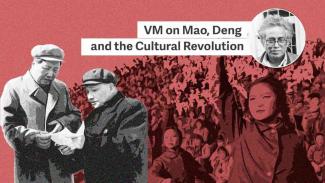“Mao repeatedly pointed out that the contradiction between capitalism and socialism is far from resolved. This struggle will go on for many years to come, may be a few hundred years, and thus the question who will win is yet to be resolved. Soviet leadership claimed that socialism can only grow into developed socialism and then into communism. Mao said no, this is wrong. This was yet another major contribution of Mao in the field of Marxist philosophy and theory.
“He had also pointed out how exactly a socialist country may transform itself back into capitalism. He opined that class struggle exists in socialist society too and there remains a bourgeoisie. This bourgeoisie organises itself within the communist party, and capitalist roaders emerge from within the Party headquarters. Later on events in Soviet Union have corroborated his analysis. Socialism’s retreat to capitalism and the capturing of Party headquarters from within by capitalist roaders occurred in Russia in exactly the way Mao had predicted. And this is the basic reason for the growing attraction towards Mao’s thought particularly after Soviet collapse.
“Summing up the experiences of various socialist countries, Mao tried to resolve this problem of great importance. This led to what is known as the Cultural Revolution in China. The Cultural Revolution ended in a failure and finally some persons, who were in no way communists, [temporarily] seized power in the Party. …
“The Cultural Revolution failed but this is not the main thing. The important thing is that Mao pinpointed the real questions and made an attempt to resolve them. The danger has been proved real and future attempts by Marxists-Leninists in resolving these questions will bank heavily upon the essence of Mao’s efforts.” (From Remembering Mao, Liberation, February 1994.)
“Deng Xiaoping, the last link in the chain of veteran revolutionaries of China, remained a controversial figure all through his political career spanning over 70 years. The debate, whether Deng was building socialism or capitalism in China, remains inconclusive; still, there is no disputing the fact that under his command China indeed emerged as a major world economic power within a period of just 10 to 15 years. The pace of economic development in China has been described as unparalleled in world history — a miracle …
“Deng has built the super-structure of modern China only over the foundations of a socialist infrastructure built under the charismatic leadership of Chairman Mao. Committed to the rule of the Communist Party and the goals of socialism, both Mao and Deng were outstanding personalities of 20th century and both played their historical roles to the hilt. Yet the million dollar question posed by Mao ‘Which will win, socialism or capitalism?’, could neither be resolved by Mao’s Cultural Revolution nor by Deng’s agenda of socialist modernisation. The quest for its resolution shall continue to haunt China of the 21st century. …
“Liberation pays tribute to the last great man in the series of historical personalities who shaped the 20th century.” From Deng Xiaoping - The Maverick Departs (Vinod Mishra, Liberation, April 1997)









